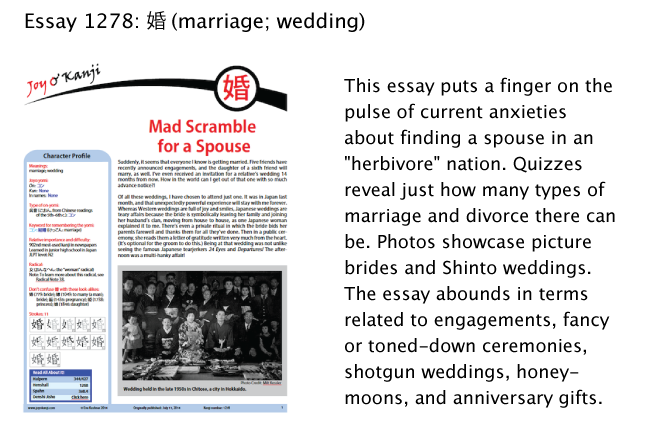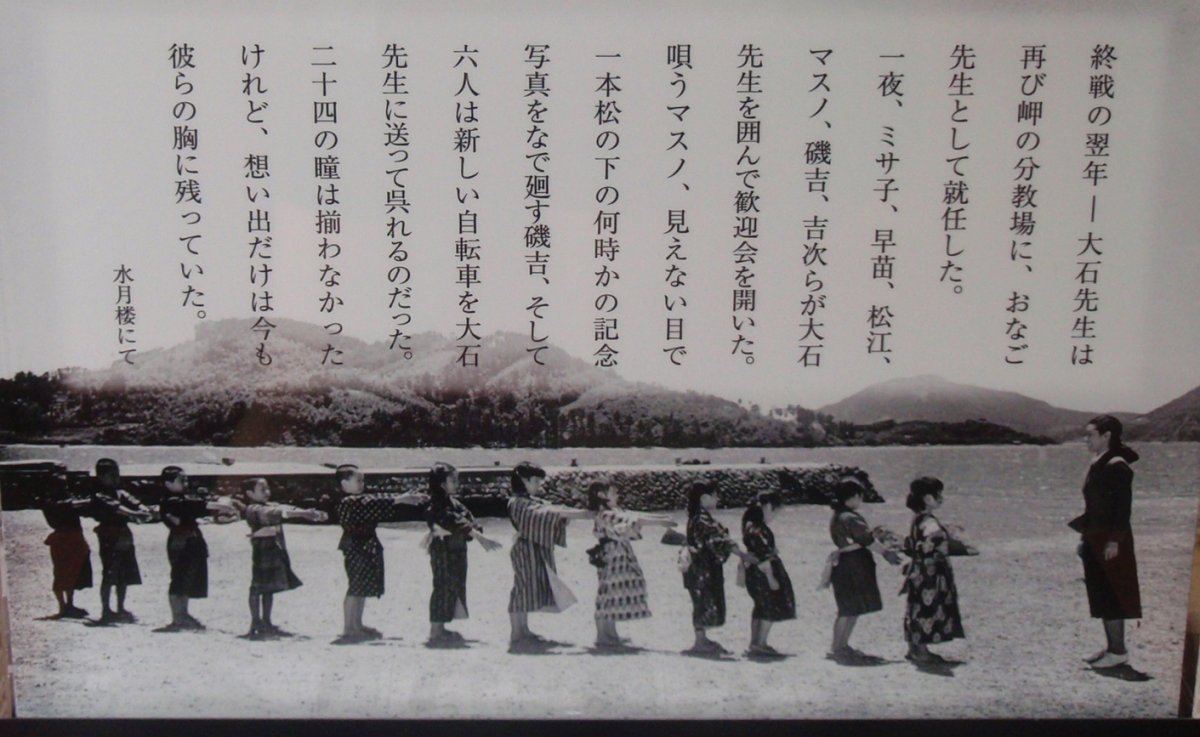Sending Us Off in New Directions
Let's start with a translation challenge. This sentence from essay 1278 on 婚 (marriage; wedding) features the keyword 離婚 (りこん: divorce). What do you think the sentence says?
不幸な年月を送った後で彼は彼女と離婚した。
I'll block the answer with a preview of the new essay:

Okay, here's the sentence again, along with all the information you'll need:
不幸な年月を送った後で彼は彼女と離婚した。
He divorced her after years of unhappiness.
不幸 (ふこう: unhappiness); 年月 (としつき: years); 送る (おくる: to spend time); 後 (あと: after); 彼女 (かのじょ: her)
The kanji are simple and familiar, but I find two large surprises here.
First, 年月 (years + months) means either "years" or "time." I've never seen either idea represented this way, and I wonder why someone felt the need to include 月 when 年 sufficiently conveys "years." Maybe the idea is that if you're enduring an eternity (especially in an unhappy marriage), you count down the years month by excruciating month (and day by painful day, hour by unbearable hour)!
Second, 送る can mean "to spend time." I haven't heard that before. In fact, this commonplace word has a slew of definitions:
送る (おくる: (1) to send (a thing); dispatch; transmit; (2) take or escort (a person somewhere); see off (a person); (3) bid farewell (to the departed); bury; (4) spend (time); live one's life; (5) pass (down the line); (6) to affix okurigana (see 送り仮名)
We see the first definition all the time. And the third definition brings to mind the wonderful 2008 tearjerker 「おくりびと」, Departures. Even though the Japanese title appeared in hiragana, the theme of the movie (preparing corpses for cremation and for the afterlife) makes it clear that the おくり relates to this third definition of 送る. Definition 6 is also familiar to me because on page 39 of Crazy for Kanji, I talked about how okurigana "send" a word off into an inflection. (I quoted Michael Pye's The Study of Kanji on that one.)
But this verb also means "to spend (time)" and "live one's life"? I just don't know how to make sense of that!
Coincidentally, 送る appears in another puzzling context in essay 1840, which com out next week. It's on 岬 (cape, headland), which appears in the photo above. The image relates to 24 Eyes (the other movie I associate with Japanese tearjerkers, oddly enough!) and includes this very-hard-to-translate sentence:
唄うマスノ、見えない目で一本松の下の何時かの記念写真をなで廻す磯吉、そして六人は新しい自転車を大石先生に送って呉れるのだった。
Masuno sang. Isokichi, who was blind, traced circles over a commemorative photograph taken in the past under the lonesome pine. The six former students presented Miss Oishi with a new bicycle.
唄う (うたう: to sing); 見える (みえる: to be able to see); 目 (め: eye); 一本松 (いっぽんまつ: solitary pine tree); 下 (した: under); 何時か (いつか: sometime in the past); 記念写真 (きねんしゃしん: commemorative photograph); なで廻す (なでまわす: to stroke with a circular motion, in which 廻 is non-Joyo); 磯吉 (いそきち: male given name, in which 磯 is non-Joyo); 六人 (ろくにん: six people); 新しい (あたらしい: new); 自転車 (じてんしゃ: bicycle); 大石 (おおいし: surname); 先生 (せんせい: teacher); 送って呉れる (おくってくれる: to present someone with a gift)
The structure of phrases such as 唄うマスノ took me by surprise, as did 見えない目 (literally, "eyes that cannot see"), which suggests that a character was fully or mostly blind. But let's focus instead on a bit near the end:
送って呉れる
Knowing that the former students couldn't have sent their old teacher a bicycle via the postal system, given that they all convened at a party, I wondered whether to define 送る as "to present."
My proofreader wasn't certain and said that, for two reasons, 送って呉れる seemed quite unusual. For one thing, おくる in this context should be 贈る. For another, he felt that the Japanese no longer write くれる in kanji. (Of course, 24 Eyes takes place during the war, so that historical context could explain the old rendering.)
However, after finding several websites on which people have used 送って呉れる, he concluded that the Japanese do still write 送って呉れる. We should therefore treat it as one phrase that means “to present a gift," he said.
So there you have it. When 送る and 呉れる combine, we need to see them in a new light. They send each other off in new directions, and we need to go along for the ride!
On that note, an imaginative comedian named Gorugo Matsumoto has spent three years trying to send Japan's juvenile deliquents off in new directions—and he's using kanji to accomplish that! Check out his very cool story on Spoon & Tamago!
Have a great weekend!


Comments